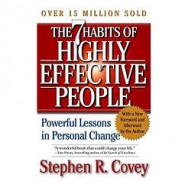In Memory of “The Seven Habits of Highly Effective People” author Stephen Covey
Posted on Jul 18, 2012 in Design/Publishing/Trends, Marketing/Sales/Advertising

Today’s blog post is dedicated to the memory of Stephen Covey who passed away yesterday, July 16, 2012 at the age of 79. He was the author of “7 Habits of Highly Effective People” – a great book if you haven’t read it! Here is a brief overview. For the complete wiki entry, click here. Thank you, Mr. Covey, for your wise words!
The Seven Habits of Highly Effective People by Stephen R. Covey sold more than 25 million copies in 38 languages. First published in 1989, the bestseller was commemorated by the release of a 15th anniversary edition in 2004. Covey presents an approach to being effective in attaining goals by aligning oneself to what he calls “true north” principles of a character ethic that he presents as universal and timeless. In August 2011, Time listed Seven Habits as one of “The 25 Most Influential Business Management Books.”
The 7 Habits
Habit 1: Be Proactive
Take initiative in life by realizing that your decisions (and how they align with life’s principles) are the primary determining factor for effectiveness in your life. Take responsibility for your choices and the consequences that follow.
Habit 2: Begin with the End in Mind
Self-discover and clarify your deeply important character values and life goals. Envision the ideal characteristics for each of your various roles and relationships in life. Create a mission statement.
Habit 3: Put First Things First
Prioritize, plan, and execute your week’s tasks based on importance rather than urgency. Evaluate whether your efforts exemplify your desired character values, propel you toward goals, and enrich the roles and relationships that were elaborated in Habit 2.
Habit 4: Think Win-Win
Genuinely strive for mutually beneficial solutions or agreements in your relationships. Value and respect people by understanding a “win” for all is ultimately a better long-term resolution than if only one person in the situation had gotten his way.
Habit 5: Seek First to Understand, Then to be Understood
Use empathic listening to be genuinely influenced by a person, which compels them to reciprocate the listening and take an open mind to being influenced by you. This creates an atmosphere of caring, respect, and positive problem solving.
Habit 6: Synergize
Combine the strengths of people through positive teamwork, so as to achieve goals no one person could have done alone. Get the best performance out of a group of people through encouraging meaningful contribution, and modeling inspirational and supportive leadership.
Habit 7: Sharpen the Saw
Balance and renew your resources, energy, and health to create a sustainable, long-term, effective lifestyle. It primarily emphasizes on exercise for physical renewal, prayer (mediation, yoga, etc.) and good reading for mental renewal. It also mentions service to the society for spiritual renewal.
source: Wikipedia


